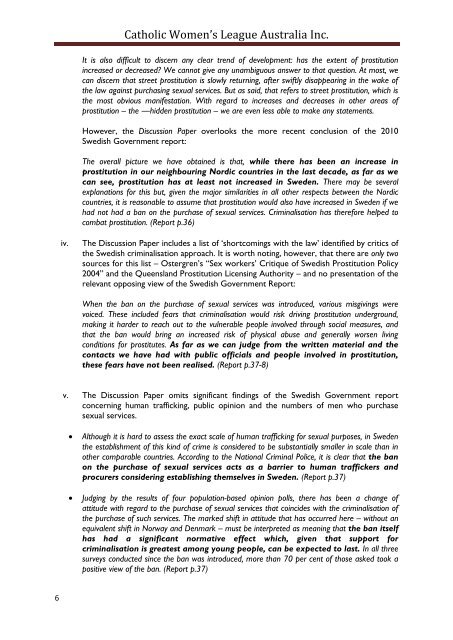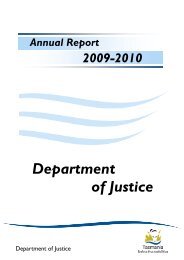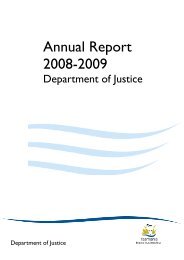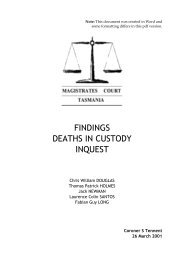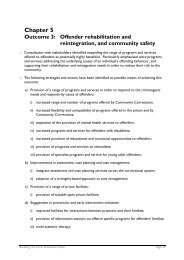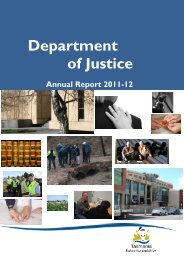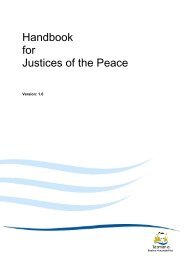Catholic Womens League - Tasmanian Department of Justice
Catholic Womens League - Tasmanian Department of Justice
Catholic Womens League - Tasmanian Department of Justice
Create successful ePaper yourself
Turn your PDF publications into a flip-book with our unique Google optimized e-Paper software.
<strong>Catholic</strong> Women’s <strong>League</strong> Australia Inc.<br />
It is also difficult to discern any clear trend <strong>of</strong> development: has the extent <strong>of</strong> prostitution<br />
increased or decreased? We cannot give any unambiguous answer to that question. At most, we<br />
can discern that street prostitution is slowly returning, after swiftly disappearing in the wake <strong>of</strong><br />
the law against purchasing sexual services. But as said, that refers to street prostitution, which is<br />
the most obvious manifestation. With regard to increases and decreases in other areas <strong>of</strong><br />
prostitution – the ―hidden prostitution – we are even less able to make any statements.<br />
However, the Discussion Paper overlooks the more recent conclusion <strong>of</strong> the 2010<br />
Swedish Government report:<br />
The overall picture we have obtained is that, while there has been an increase in<br />
prostitution in our neighbouring Nordic countries in the last decade, as far as we<br />
can see, prostitution has at least not increased in Sweden. There may be several<br />
explanations for this but, given the major similarities in all other respects between the Nordic<br />
countries, it is reasonable to assume that prostitution would also have increased in Sweden if we<br />
had not had a ban on the purchase <strong>of</strong> sexual services. Criminalisation has therefore helped to<br />
combat prostitution. (Report p.36)<br />
iv.<br />
The Discussion Paper includes a list <strong>of</strong> ‘shortcomings with the law’ identified by critics <strong>of</strong><br />
the Swedish criminalisation approach. It is worth noting, however, that there are only two<br />
sources for this list – Ostergren’s “Sex workers’ Critique <strong>of</strong> Swedish Prostitution Policy<br />
2004” and the Queensland Prostitution Licensing Authority – and no presentation <strong>of</strong> the<br />
relevant opposing view <strong>of</strong> the Swedish Government Report:<br />
When the ban on the purchase <strong>of</strong> sexual services was introduced, various misgivings were<br />
voiced. These included fears that criminalisation would risk driving prostitution underground,<br />
making it harder to reach out to the vulnerable people involved through social measures, and<br />
that the ban would bring an increased risk <strong>of</strong> physical abuse and generally worsen living<br />
conditions for prostitutes. As far as we can judge from the written material and the<br />
contacts we have had with public <strong>of</strong>ficials and people involved in prostitution,<br />
these fears have not been realised. (Report p.37-8)<br />
v. The Discussion Paper omits significant findings <strong>of</strong> the Swedish Government report<br />
concerning human trafficking, public opinion and the numbers <strong>of</strong> men who purchase<br />
sexual services.<br />
<br />
<br />
Although it is hard to assess the exact scale <strong>of</strong> human trafficking for sexual purposes, in Sweden<br />
the establishment <strong>of</strong> this kind <strong>of</strong> crime is considered to be substantially smaller in scale than in<br />
other comparable countries. According to the National Criminal Police, it is clear that the ban<br />
on the purchase <strong>of</strong> sexual services acts as a barrier to human traffickers and<br />
procurers considering establishing themselves in Sweden. (Report p.37)<br />
Judging by the results <strong>of</strong> four population-based opinion polls, there has been a change <strong>of</strong><br />
attitude with regard to the purchase <strong>of</strong> sexual services that coincides with the criminalisation <strong>of</strong><br />
the purchase <strong>of</strong> such services. The marked shift in attitude that has occurred here – without an<br />
equivalent shift in Norway and Denmark – must be interpreted as meaning that the ban itself<br />
has had a significant normative effect which, given that support for<br />
criminalisation is greatest among young people, can be expected to last. In all three<br />
surveys conducted since the ban was introduced, more than 70 per cent <strong>of</strong> those asked took a<br />
positive view <strong>of</strong> the ban. (Report p.37)<br />
6


